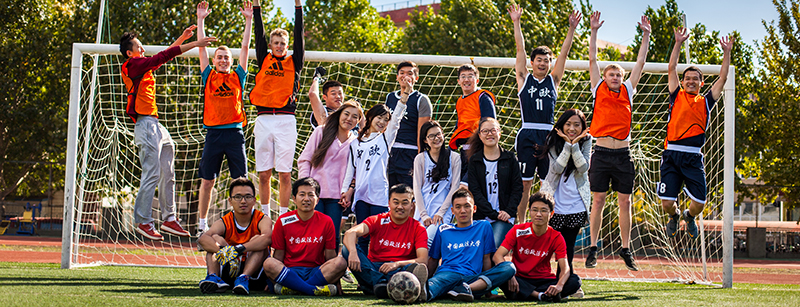One semester of Chinese law in Beijing: Robin Koza, a 22-year-old law student from the University of Hamburg, attended the China-EU School of Law in 2015. In this interview, he talks about Chinese school rules and eating with two pairs of chopsticks.

From Hamburg to Beijing: Robin Koza is one of approximately 6,000 Germans who study in China each year.
You have just completed your last exams for the “Chinese Law Taught in English” programme, three tests and four essays. How did you benefit from this semester for your legal studies?
This semester I gained a broader perspective which wasn’t dominated by the German legal system any more, but rather I compared other legal approaches. Eight nationalities were represented in the classroom: Indian, Russian, German, Spanish, Polish, Irish, Dutch and, of course, Chinese. It was a privilege for me to discuss and study in this diverse setting and in small groups of 20 to 25 students.
Do Chinese law students study in a different way than German law students?
While looking for a flat a Chinese friend asked my flatmate and me whether we need a second desk so that we could both study at night. Chinese students study with extraordinary discipline, but they focus on memorising. You are not allowed to use legal texts in exams; you must keep the laws in mind. In Germany, in my view, legal studies are more methodological which seems to be more effective. I was also surprised that professors asked Chinese students to stand up in class when answering questions.
How did you like China in general?
To gain as many impressions as possible during a semester abroad I liked China very much. China is an inspiring experience. This aspiring nation offers so much – from its cultural heritage to its fascinating landscape to its modern city centers. However, it can be stressful. Everything is always on the move, silence is extremely rare. Public traffic in Beijing, for instance, is a test of courage. I also had to get used to the Chinese food culture. We visited the Beijing office of the DLA Piper law firm due to a fellow student’s contact. Afterwards we dined in a restaurant which offered two pairs of chopsticks at each place setting, one for eating and one for serving others. That was a very nice and convivial way of eating.
What was your favourite course at the China-EU School of Law?
My favourite course was “Nonprofit Organisations” taught by Qu Hong, a very open, committed professor. She organised a visit to the leading Chinese law firm Dacheng with a shuttle bus where we could talk with a lawyer about how Chinese nonprofit organisations act in China. It was also very impressive to visit a criminal trial as part of Prof. Yue Liling’s “Chinese Criminal Justice” course. In general, it was also very helpful how well the China-EU School of Law fit into my study schedule. In January, after the semester abroad, I started an internship at a law firm specialising in media law before the new term began. I could have written additional term papers as well.
What surprised you most about China?
The first couple of days were energy-sapping. I experienced culture shock more than I had expected. It was challenging with a foreign language, unfamiliar food and a sense of uncertainty over where to stay. However, in spite of those initial doubts, I decided then to remove all those obstacles and see through what I had started. After all, I had chosen China, not Australia, America or Europe, for the very reason that I wanted to get to know a different political system and a non-western culture. Looking back today I am surprised how well I handled the whole situation, and I am proud I managed to do that. You grow a lot from a semester abroad.
What helped you the most?
Friendship. In the first few days in particular Tom and I, a fellow student from Hamburg, found support and motivation in our friendship. Additionally, I was very lucky to get in touch with a Chinese student who became a close friend. Juncheng, his Western name is Sebastian, studies law and German at the China University of Political Science and Law. He helped us, for instance, rent a nice flat right across the street from the Changping Campus that cost only 200 Euro rent per month per person. In a few months he’ll come and visit before he starts an internship at the German parliament. I can only recommend to every European student in China to ask at the university for a Chinese buddy who helps guide you through the beginning of the semester and maybe also becomes a friend.

Football, table tennis, badminton: Students as keen on sports as Robin Koza (in the back, third from the left) enjoy themselves on the Changping Campus
Article by Ursula Zipperer
